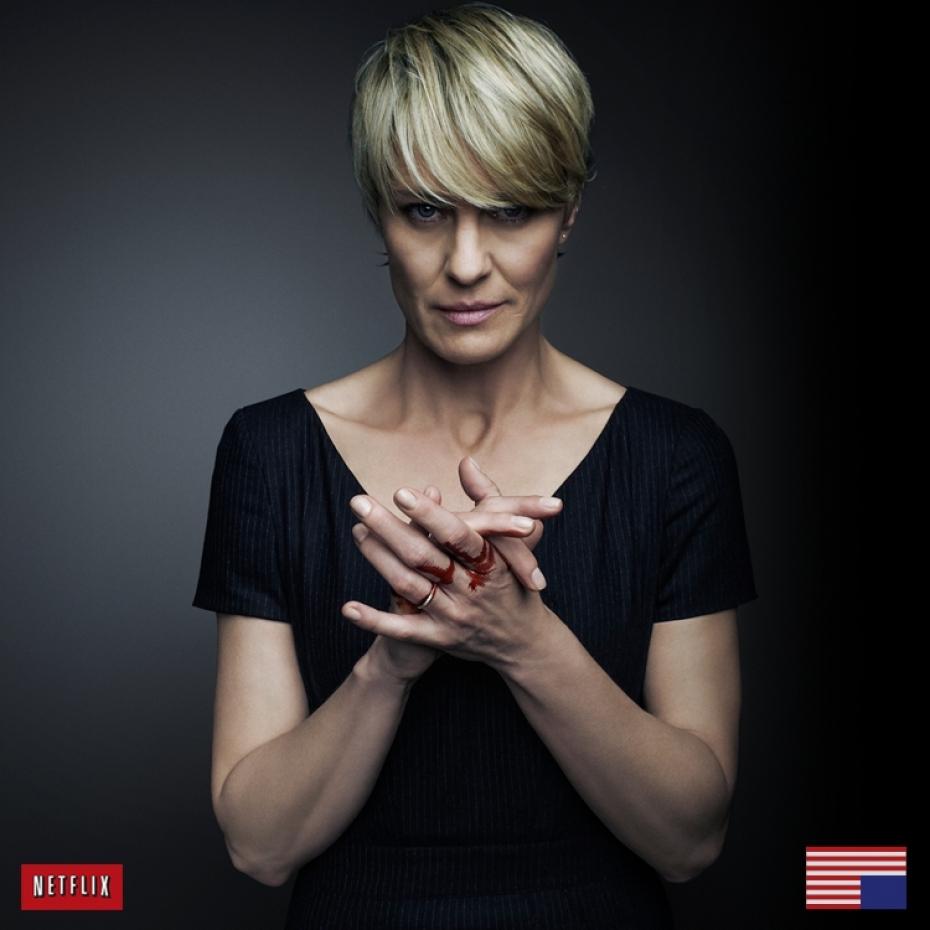This post is part of a series on Defense Mechanisms for Mental Health Awareness Week 2016. To know more, read the introduction to the series here.
“Behind every great man is a great woman” is a saying that we have often heard. However, in the case of Claire Underwood from House of Cards, it is the series tagline which fits best – “Behind every great man is a woman with blood on her hands.”
Who is Claire Underwood?
Claire Underwood is a fictional character from the American political drama, House of Cards and is married to the protagonist, Frank Underwood. She runs a nonprofit, and in later seasons ascends to becoming the Second Lady of the United States, and finally, the First Lady of the United States.
In the series, Claire Underwood is portrayed as an extremely intelligent and focused person who has mastered the art of overcoming all kinds of emotions. She is cold, power hungry and manages to crucify anybody who comes in her way. She is perceived as an ideal person for the public eye – an image which she has cultivated for Frank and herself. The tension beneath the surface comes to the fore as the drama evolves.
Claire Underwood’s Defenses
Those who have followed this award-winning drama from its launch will know that Claire Underwood hasn’t really bothered washing the blood off her hands. The blood on her hands may have been dropped by her murderous husband, but as the driving force in their marriage and a modern day lady, she is in no hurry to wash it off.
Intellectualization
Here, it is observed that though she is very much aware that her husband is involved in the death of Zoe Barnes and Peter Russo, she doesn’t seem to acknowledge it. It seems like she is using the defense of Intellectualization.
In Intellectualization, one tries to avoid facing unpleasant emotions and rather focuses exclusively on reason, logic or facts. For example, if you’re struggling with the problem of procrastination at work/college, rather than addressing the underlying feelings (demotivation or sadness) you might get into researching ‘scientifically’ the issue of procrastination, looking up statistics about it and so on.
Thus, rather than dealing with the emotion of pain, Claire employs intellectualization to distance herself from the event.
Denial
Underneath Claire’s veneer, she constantly struggles to create a sense of reality for herself. She does not acknowledge that her marriage is not working with Frank and thus uses Denial as a defense.
Denial is a defense wherein, one simply refuses to accept reality or a fact and behaves as if it doesn’t exist or as if it weren’t true. A common example would be the reaction of individuals when they hear of the death of a loved one. It is often observed that the initial reaction is that of disbelief and sometimes, it goes on to a full-blown denial, where the individual continues to behave as though the other is still living – cooking for them, cleaning their room etc.
But Claire’s Denial does not always succeed – much like anyone else’s.
Claire: We’ve been lying for a long time, Francis.
Francis Underwood: [livid about her actions] You’re not only the First Lady, and an Ambassador, you’re also my wife.
Claire Underwood: In what order?
Claire Underwood: We’re murderers, Francis.
Francis Underwood: No we’re not, we’re survivors.
Francis Underwood: I should have never made you Ambassador, Claire.
Claire Underwood: I should have never made you President. (walks out)
Claire is not the person she expected herself to be and has focused her entire adult life to achieve power either for herself or for her husband. The motive for this might be so that she feels better about herself and can justify her choices.
Take for instance, the affair with the photographer with whom she was intimate for years. When his presence was beginning to interfere with her (and her husband’s) public image, she punished this same guy in full public view, expecting him to take the fall for her. She is always on her guard and did not accept the emotional consequences of her relationship with him.
What Underlies Claire Underwood’s Defenses?
As we continue to see Claire’s nuances, a pattern that is quite striking, is her need to ‘avoid‘ and escape a lot of things in her core relationships. This need stems from the key issue of protecting herself from the fears she has acquired over the years growing up in a political household along with the strained relationship with her mother.
Claire Underwood: When my father died, it destroyed me, but when I think about Mother, I feel nothing.
Donald Blythe: You two aren’t close?
Claire Underwood: No. And I feel the same about Francis. Nothing.
We tend to use such defences to protect ourselves, albeit consciously or subconsciously, but the cause is fear – fear of losing something. As a result, we constantly try to avoid anything that triggers these fears. Avoidance is a simple way of coping by not having to cope, of closing our eyes and clicking our emerald shoes with the idea that everything will be as it should be. When feelings of discomfort appear, we find ways of not experiencing them.
The following seasons may reveal how and if Claire confronts her latent issues. For Claire to have any sort of catharsis and the drama as a whole to reach closure, Claire’s fears and latent desires about who she is need to come to the forefront.
In what ways do you see yourself employing Intellectualization and Denial in your lives? Both these defenses help you avoid facing difficult realities, difficult emotions. Which ones do you feel afraid to confront?
Post Contributed by: Nandita Sarma
Image Credit: Netflix (This image is used under the Fair Use Policy, as it is part of a free, online blog and is not being used to sell any product or service.)


